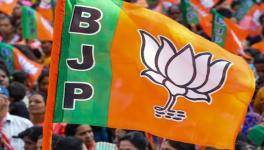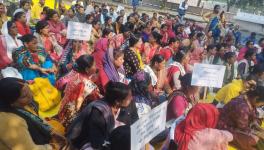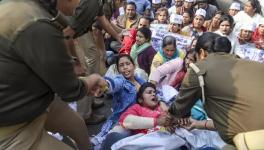UP: Yogi's ‘Smart’ Push to Classroom Teaching, but 14,630 Primary Schools Lack Power Supply

Lucknow: The Yogi Adityanath-led Bharatiya Janata Party (BJP) government is promoting digital learning to make Uttar Pradesh a proficient state and classroom teaching more effective. However, as many as 14,630 government-run primary and upper primary schools across the state, mainly in rural areas, are still functioning without electricity. Both teachers and students of these institutions have been sweating it out, literally.
The review meeting held recently revealed that about 14,630 schools are still deprived of electricity connection, and students here have no fans and lights for them. Due to this, online teaching, including smart classes, are affected.
In view of this, all Basic Shiksha Adhikaris have been instructed to immediately apply on the portal and contact officials of the electricity department to get the power connection for the schools. For this, a budget has been arranged through 'Operation Kayakalp'.
Most of the schools that do not have electricity connections are in rural areas. Even electric poles tere are 40 meters apart. Therefore, a request has been made to the electricity department to electrify the schools by arranging electric poles.
The state government has ensured that all these schools will soon be provided with new connections.
As per the state basic education department records, around 309 government primary and upper primary schools in Prayagraj, 406 in Pratapgarh and 405 in Fatehpur still lack power connections. Kaushambi, however, is the only district in the division where all the existing 978 schools have proper electricity supply.
For many years now, the scorching heat has been making things difficult for students and teachers. During winters, in the early hours of the day, the classes get too cold and dark. There is fog around the schools. As a result, children are unable to read books.
"We have asked our teacher to address the issue but to no avail," Rinku, a student in Gonda, told NewsClick.
Virendra Mishra, national spokesperson of Rashtriya Shaikshik Mahasangh (RSM), a national union of primary school teachers, told NewsClick, "Despite Operation Kayakalp, in which basic facilities, such as providing boundary walls, toilets, drinking water, and electrification, around 15,000 primary school are still functioning without electricity. In the past two years, officials of the electricity and education departments have held review meetings and allocated some funds. Yet, electricity is a far cry in rural schools, affecting the studies of poor students."
According to some officials, funds have been arranged through 'Operation Kayakalp'. In rural areas, especially in remote schools, a request has been made to the Power Corporation for immediate additional arrangements of electric poles in case the distance from the electric pole to the school is more than 40 meters.
As per Basic Education Department documents related to electrification of primary schools in UP, about 3,000 such schools are located in remote areas. Half of these are 1.5 km away from electric poles. Similarly, there are about 123 schools from where the distance from electricity poles is 4-5 km.
In March, the Basic Education Department announced a target to transform 30,000 schools in UP into ‘smart schools’. Another ambitious target is to provide one tablet each to two lakh primary education schools. The department has claimed that there has been significant progress in this regard. The state already has 12,000 schools with smart classes. This announcement came right before the UP government said it had earmarked Rs 2,000 crore for the development of primary and upper-primary schools.
However, teachers’ unions NewsClick spoke to denied the Basic Education Department's claims. “There are very few schools where the entire criteria of smart class has been fulfilled. Some schools have no electricity connection; some schools have everything (poles etc), but there is no electricity.
Chief Minister Adityanath has ordered power supply for at least 18 hours in rural areas, but we hardly get power supply in school hours, says Santosh Maurya, a teacher in Lakhimpur Kheri. “The government must ensure at least three hours mandatory electricity to schools so that we can use smart classes and run submersibles. We handed over dozens of memoranda to the district administration and political parties, but to not avail," he told NewsClick.
Maurya further said that school timings of government-run primary schools will be from 9 a.m to 3 p.m, which makes it tough for children to study in scorching heat.
Get the latest reports & analysis with people's perspective on Protests, movements & deep analytical videos, discussions of the current affairs in your Telegram app. Subscribe to NewsClick's Telegram channel & get Real-Time updates on stories, as they get published on our website.
























